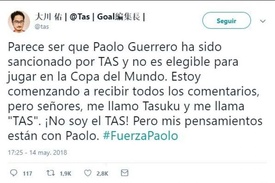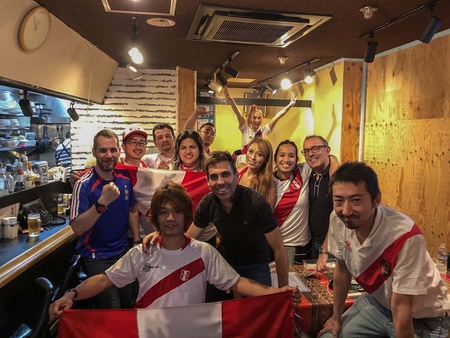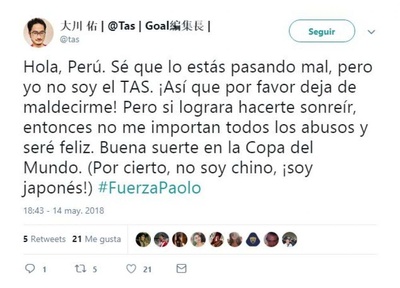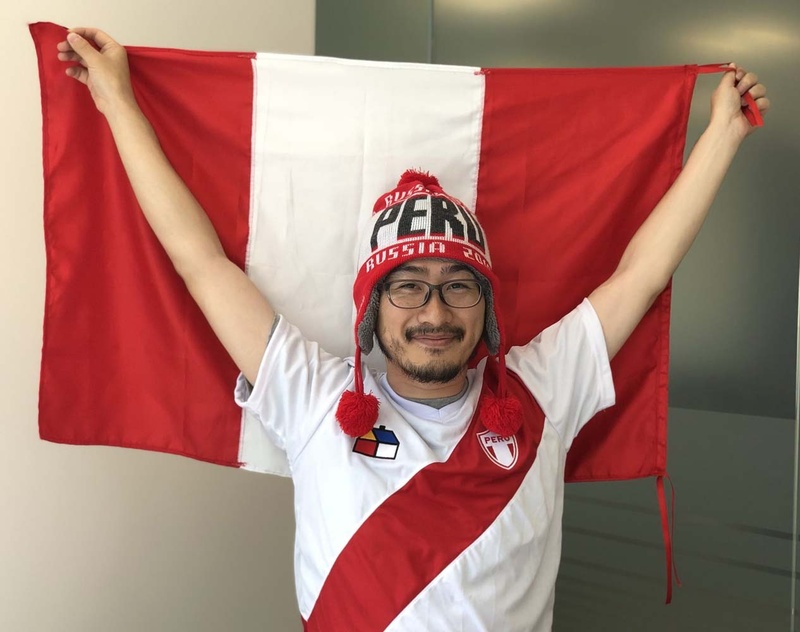When the Tribunal Arbitral du Sport (TAS) issued a 14-month sanction that prevented the captain of the Peruvian soccer team, Paolo Guerrero, from participating in the World Cup in Russia, the Japanese journalist Tasuku Okawa, whose Twitter account (@tas) coincides with the acronym of the sports organization, received an avalanche of unpleasant messages from the outraged Peruvian fans.
IT ALL STARTED WITH A TWEET

After asking them to stop confusing him and clarifying that he is not the TAS, netizens expressed their sympathy on Twitter. What followed is known history: the sanction was suspended and Guerrero was able to play in Russia with the Peruvian team, which was returning to a Soccer World Cup after 36 years.
From Japan, Tasuku turned offenses into an opportunity to be part of the Peruvian team. “I felt like it was destiny. This was not the first time, the same thing happened (the confusion) with Atlético de Madrid in Spain last year. Now many Peruvians were interested in me, and I also became interested in Peru,” he says.
Tasuku encouraged the Peruvian team during the World Cup as just another Peruvian. During the three dates he went to a Peruvian restaurant in Tokyo, where he met to watch the games with some compatriots who live in the Asian country. There he tried ceviche, lomo saltado and drank pisco sour for the first time. “Everything was delicious,” he remembers.

The faith continued intact after the first duel against the Danes despite the defeat. But on June 21, Peru was left with no chance of progressing to the round of 16 after losing to France. "This summer's dream is over, but my friendship endures. Thank you, Peru," Tas tweeted from Japan.
Regarding the best memory he has from the Blanquirroja's participation, the journalist tells us: “I think the objective was to see a goal by Guerrero in the World Cup, and it was achieved against Australia. Although Peru did not qualify for the next phase, I am sure they left their mark. The presence of a passionate fan has remained in everyone's memory.
“The enthusiasm of the fans of the Peruvian team was extraordinary. I also wanted to be in the stands, supporting the team along with them. The fans of the Peruvian team are passionate and affectionate,” Tas admits in admiration.

THE SURPRISING JAPAN
The World Cup kept Tasuku, like many members of the Nikkei community, cheering for Peru and Japan, which made the news not only for its exemplary fans but also for its good football. “It has never happened that we had cornered a champion team like Belgium for a moment until 2-0. Being among the best 16 was a feat.”
Both teams demonstrated a committed and loyal fan base. Tas recognizes that fusion is enriched by harmony: “The positive thing about the Japanese is their seriousness and neatness, although they can be very rigorous. Peruvian warmth marks an important balance.”
The World Cup came to an end, but one wish remained pending: to visit Peru before its next World Cup experience.
British influence
The sports journalist for the Goal Japan portal is passionate about football. He was born in the city of Kobe in 1981, and due to his father's work he moved several times, but it was in England where his interest in football grew.
“I played since I was a child, but the France 98 World Cup marked my taste for soccer. Since I lived in England, I am influenced by the British, but I always followed the Japanese team. “I’m a big fan of Hidetoshi Nakata,” he says.
“The fascinating thing about soccer is that people around the world can understand each other with a ball.”
* This article is published thanks to the agreement between the Peruvian Japanese Association (APJ) and the Discover Nikkei Project. Article originally published in Kaikan magazine No. 115, and adapted for Discover Nikkei.
© 2018 Texto y fotos: Asociación Peruano Japonesa








